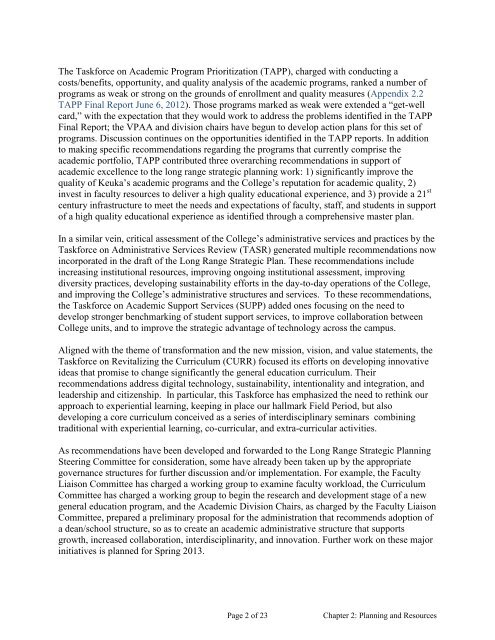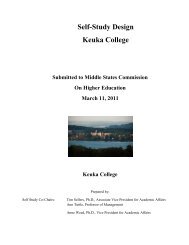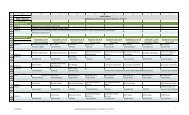final version of the self-study document - Keuka College's Middle ...
final version of the self-study document - Keuka College's Middle ...
final version of the self-study document - Keuka College's Middle ...
You also want an ePaper? Increase the reach of your titles
YUMPU automatically turns print PDFs into web optimized ePapers that Google loves.
The Taskforce on Academic Program Prioritization (TAPP), charged with conducting a<br />
costs/benefits, opportunity, and quality analysis <strong>of</strong> <strong>the</strong> academic programs, ranked a number <strong>of</strong><br />
programs as weak or strong on <strong>the</strong> grounds <strong>of</strong> enrollment and quality measures (Appendix 2.2<br />
TAPP Final Report June 6, 2012). Those programs marked as weak were extended a “get-well<br />
card,” with <strong>the</strong> expectation that <strong>the</strong>y would work to address <strong>the</strong> problems identified in <strong>the</strong> TAPP<br />
Final Report; <strong>the</strong> VPAA and division chairs have begun to develop action plans for this set <strong>of</strong><br />
programs. Discussion continues on <strong>the</strong> opportunities identified in <strong>the</strong> TAPP reports. In addition<br />
to making specific recommendations regarding <strong>the</strong> programs that currently comprise <strong>the</strong><br />
academic portfolio, TAPP contributed three overarching recommendations in support <strong>of</strong><br />
academic excellence to <strong>the</strong> long range strategic planning work: 1) significantly improve <strong>the</strong><br />
quality <strong>of</strong> <strong>Keuka</strong>’s academic programs and <strong>the</strong> College’s reputation for academic quality, 2)<br />
invest in faculty resources to deliver a high quality educational experience, and 3) provide a 21 st<br />
century infrastructure to meet <strong>the</strong> needs and expectations <strong>of</strong> faculty, staff, and students in support<br />
<strong>of</strong> a high quality educational experience as identified through a comprehensive master plan.<br />
In a similar vein, critical assessment <strong>of</strong> <strong>the</strong> College’s administrative services and practices by <strong>the</strong><br />
Taskforce on Administrative Services Review (TASR) generated multiple recommendations now<br />
incorporated in <strong>the</strong> draft <strong>of</strong> <strong>the</strong> Long Range Strategic Plan. These recommendations include<br />
increasing institutional resources, improving ongoing institutional assessment, improving<br />
diversity practices, developing sustainability efforts in <strong>the</strong> day-to-day operations <strong>of</strong> <strong>the</strong> College,<br />
and improving <strong>the</strong> College’s administrative structures and services. To <strong>the</strong>se recommendations,<br />
<strong>the</strong> Taskforce on Academic Support Services (SUPP) added ones focusing on <strong>the</strong> need to<br />
develop stronger benchmarking <strong>of</strong> student support services, to improve collaboration between<br />
College units, and to improve <strong>the</strong> strategic advantage <strong>of</strong> technology across <strong>the</strong> campus.<br />
Aligned with <strong>the</strong> <strong>the</strong>me <strong>of</strong> transformation and <strong>the</strong> new mission, vision, and value statements, <strong>the</strong><br />
Taskforce on Revitalizing <strong>the</strong> Curriculum (CURR) focused its efforts on developing innovative<br />
ideas that promise to change significantly <strong>the</strong> general education curriculum. Their<br />
recommendations address digital technology, sustainability, intentionality and integration, and<br />
leadership and citizenship. In particular, this Taskforce has emphasized <strong>the</strong> need to rethink our<br />
approach to experiential learning, keeping in place our hallmark Field Period, but also<br />
developing a core curriculum conceived as a series <strong>of</strong> interdisciplinary seminars combining<br />
traditional with experiential learning, co-curricular, and extra-curricular activities.<br />
As recommendations have been developed and forwarded to <strong>the</strong> Long Range Strategic Planning<br />
Steering Committee for consideration, some have already been taken up by <strong>the</strong> appropriate<br />
governance structures for fur<strong>the</strong>r discussion and/or implementation. For example, <strong>the</strong> Faculty<br />
Liaison Committee has charged a working group to examine faculty workload, <strong>the</strong> Curriculum<br />
Committee has charged a working group to begin <strong>the</strong> research and development stage <strong>of</strong> a new<br />
general education program, and <strong>the</strong> Academic Division Chairs, as charged by <strong>the</strong> Faculty Liaison<br />
Committee, prepared a preliminary proposal for <strong>the</strong> administration that recommends adoption <strong>of</strong><br />
a dean/school structure, so as to create an academic administrative structure that supports<br />
growth, increased collaboration, interdisciplinarity, and innovation. Fur<strong>the</strong>r work on <strong>the</strong>se major<br />
initiatives is planned for Spring 2013.<br />
Page 2 <strong>of</strong> 23 Chapter 2: Planning and Resources




